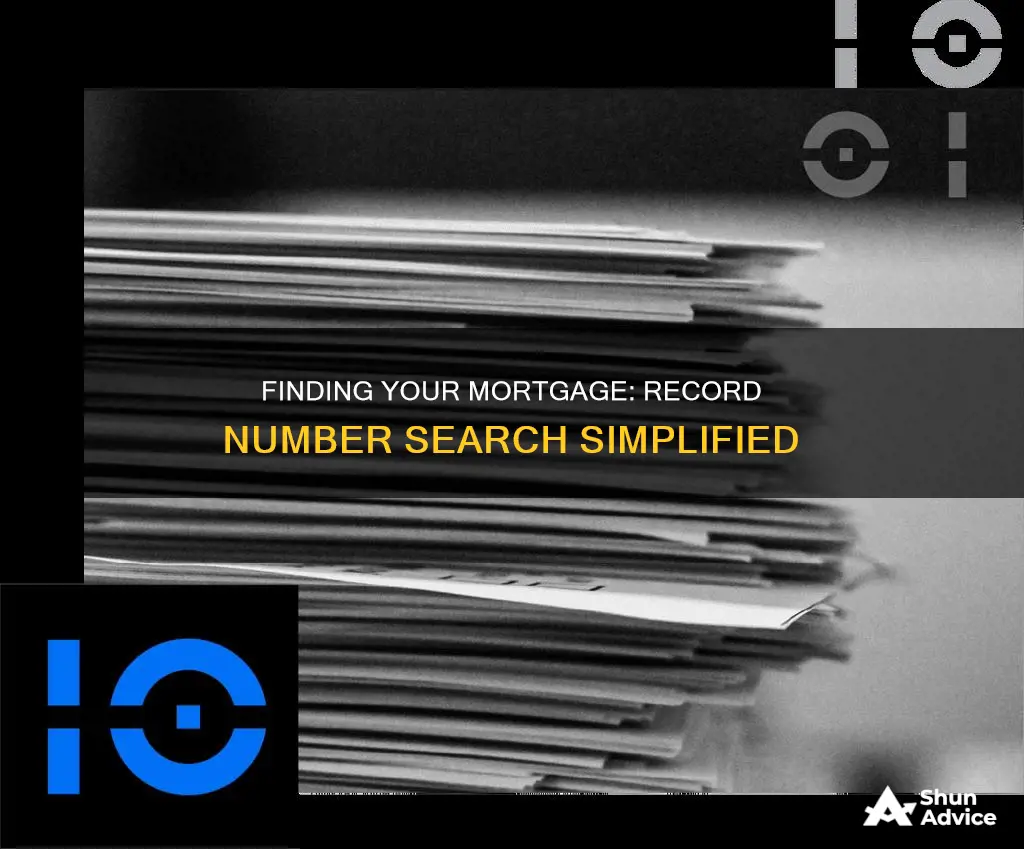
There are several reasons why you may want to access the mortgage records of a property. These records are public and can be found online, by phone, or by visiting the local office. They can provide important information about the property and its owners, such as how motivated they may be to sell. You can find the mortgage recorded number by searching for the owner's name, which is also a matter of public record. You can also contact the company that paid off your loan, or the local Secretary of State or county recorder of deeds.
| Characteristics | Values |
|---|---|
| Public mortgage records | Can be accessed online, by phone, or by visiting the office of the county recorder |
| Information included in public mortgage records | Property's legal description, address, lender, mortgage amount, and other information related to the property |
| Other ways to find mortgage records | Contact the company that paid off the loan, or the local Secretary of State |
What You'll Learn

Public mortgage records
There are several ways to access public mortgage records. Firstly, you can contact the recorder's office in the state and county where the property is located. Alternatively, you can access the clerk's official website and download the mortgage documents online. In some cases, you may need to create an account to access these records, and there may be a small fee for obtaining copies of documents.
If you are looking for information about who owns your mortgage, you can contact your mortgage servicer. They are obligated to provide you with the name, address, and telephone number of the owner of your loan. You can find the contact information for your mortgage servicer on your monthly mortgage statement or coupon book. Additionally, online tools offered by entities such as Fannie Mae and Freddie Mac can be used to look up who owns your mortgage.
It is important to note that not all information related to mortgages and property sales is publicly available. For example, sales prices may not be public record in all states and jurisdictions. Additionally, in some counties, documents cannot be accepted into land records until they are endorsed by the county's finance or treasurer's office and taxes are collected.
Finding Homeowner Mortgage Details: A Property Guide
You may want to see also

Contacting the servicer
You can find the number for your mortgage servicer on your monthly mortgage statement or coupon book. You can also send a written request to your mortgage servicer. This can be a Qualified Written Request or a Request for Information. Under federal law, the servicer must respond within 30 days, telling you who owns the mortgage.
If you need general information about your loan account, such as the monthly payment amount, the next due date, or late fee information, you can call your servicer. If you're behind on payments and want to find out about loss mitigation options, you should also contact the loan servicer. Similarly, if you want to apply for assistance under your state's Homeowner Assistance Fund program, you can contact your servicer to find out if it participates.
If you are unsure who your new servicer is, you can try calling the customer service number provided by your previous servicer. You can also try looking up the new company's work number or recording the dates and times you spoke with them. Emailing the new company can also be a good way to create a paper trail, showing your attempts to resolve the issue.
Understanding Your Mortgage Grace Period: What You Need to Know
You may want to see also

Online tools
There are several online tools available to help you find your mortgage-recorded number. Firstly, you can find the number for your mortgage servicer on your monthly mortgage statement or coupon book. This number can be used to contact your servicer to request information about your mortgage. Under federal law, the servicer is required to respond to your request, typically within 30 days, and provide information on who owns the mortgage.
Additionally, there are several online lookup tools provided by government-sponsored enterprises such as Fannie Mae and Freddie Mac. These enterprises often buy loans from lenders, so their lookup tools can help you find out if they own your loan. Both Fannie Mae and Freddie Mac offer online mortgage lookup tools on their respective websites.
In some cases, you may need to identify your loan servicer first before determining the owner of your mortgage. This is because the loan servicer is responsible for the day-to-day management of the loan and may be a different company from the loan owner. You can usually find the contact information for your loan servicer on your monthly statement or by searching the Mortgage Electronic Registration Systems (MERS) website.
It is important to note that mortgage records are typically maintained by government offices, and the specific office may vary depending on the state or county. These records are generally available to the public, and you can often access them through online public records searches. However, the availability of online records may differ across jurisdictions. Therefore, it is recommended to search for real estate records specific to your city or county.
Finding Non-Recourse Mortgages: What You Need to Know
You may want to see also

Freedom of Information laws
Mortgage records are a valuable source of information for prospective buyers when making an offer on a home. These records can provide insights into the current owners' motivations, such as their willingness to sell the property. Additionally, mortgage records show details like the mortgage amount, property address, and lender information.
To access mortgage records, one must first obtain information about the current homeowner, including their name and the property's full street address. The next step is to identify the state and county where the property is located and contact the appropriate recorder's office. Alternatively, one can access the clerk's official website and download the mortgage documents online, which may require paying any necessary fees.
It is important to note that each state has different "recording statutes" governing home deeds and mortgage documents. These laws outline the requirements for the formal recording of real property in a county office. While the specifics vary from state to state, these statutes ensure that properly recorded properties have mortgage records available to the public.
In certain cases, such as in Texas, there may be restrictions on disclosing specific information related to financial institutions or ongoing investigations. These confidentiality protections are outlined in statutes like the Public Information Act and other state laws.
Finding Paid-Off Mortgages: Strategies for Success
You may want to see also

County records
To find your mortgage-recorded number, you'll need to refer to county records, as mortgage information is maintained at the county level. Each county has a designated office responsible for recording and maintaining property-related documents, typically the County Recorder, County Clerk, or Register of Deeds.
Here's a step-by-step guide to help you find your mortgage recorded number through county records:
Identify the Relevant County Office: As mentioned, the specific office may vary by county
Finding Mortgage Protection: Where to Start Your Research
You may want to see also
Frequently asked questions
You can find your mortgage recorded number by searching for the owner's name, which is also a public record. You can also find the number by contacting your local Secretary of State or county recorder of deeds. Additionally, you can look up who owns your mortgage online, or you can call or send a written request to your servicer.
A mortgage recorded number is a unique identifier for a mortgage account. It is used to keep track of the mortgage and all associated documentation.
Your mortgage recorded number is important as it can help you access information such as the property's legal description, address, lender, and mortgage amount.
You can find information about your property's mortgage record by visiting the county recorder's office or by accessing the clerk's official website.
A mortgage lender is an institution or individual that lends money to a borrower for the purchase of a property. A mortgage servicer, on the other hand, is responsible for the day-to-day management of the loan, including collecting payments and handling customer service inquiries.







